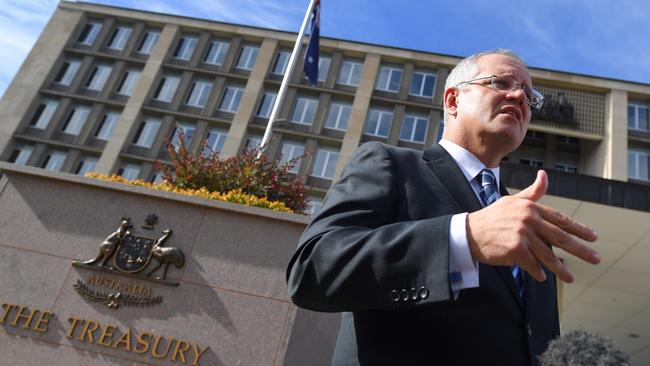James Pearson: When Treasurer Scott Morrison hands down his Federal Budget we should ask five key questions
THERE are five key questions everyone should be asking when Treasurer Scott Morrison hands down his Federal Budget next Budget, says James Pearson.
Opinion
Don't miss out on the headlines from Opinion. Followed categories will be added to My News.
- University degrees to cost more under Federal funding review
- Treasurer Scott Morrison to tighten government spending
- Federal Budget to push generic drugs
WHEN Treasurer Scott Morrison hands down the Budget next week, we will all be keen to know what it means for us: What will it mean for the taxes we pay and the government programs we use?
While those questions might tell us whether we’ll be better off or worse off in the short term, they fail to consider whether it helps Australia become more economically competitive.
That’s why we need some new questions to judge the Budget. When we hear announcements on spending and tax, here are five questions we should ask.
First, does it deliver a positive return on investment?
Not all spending is equal. As anyone who has balanced a household budget knows, there’s a big difference between the things we need and the things we want.
We need to make sure spending builds the economy’s capacity to create jobs and improve living standards. This means we need to skill young people for the jobs of the future and develop infrastructure to move goods, people and information.
Second, does it make government programs more sustainable?

With 35 per cent of Federal Government spending going to social security and welfare, and a further 16 per cent going to health, making sure money is well spent can make a big difference to affordability.
Third, could a program be delivered more efficiently by the private sector?
In education, health and aged care, many private sector providers could deliver public services, which can improve the experience for users and often ensure better value for money.
One study found that cost reductions of 20-25 per cent are not unusual when public services are opened up to competition.
Fourth, will a decision lead to more or less red tape?
We know red tape is a headache for many business operators, who need to grapple with business activity statements, superannuation paperwork and development approvals.
The Government says it has saved $4.8 billion in red tape compliance costs over the past four years. This is welcome, and it is important that new initiatives do not create red tape in its place.
Fifth, what legacy will the program leave for future generations?
A deficit budget, like the ones Australia has had for nearly a decade, means we are borrowing money today that will create a debt burden for our children.
Australia’s gross debt is forecast to exceed half a trillion dollars within months, and rise to $600 billion by 2020. Every dollar of new spending is a dollar extra we will need to borrow.
To make sure our living standards continue to improve, Australia needs to become more competitive.
This requires national finances on a credible path to surplus, a tax system that encourages hard work and investment, and a safety net that helps people get back on their feet.
James Pearson is chief executive of the Australian Chamber of Commerce and Industry



